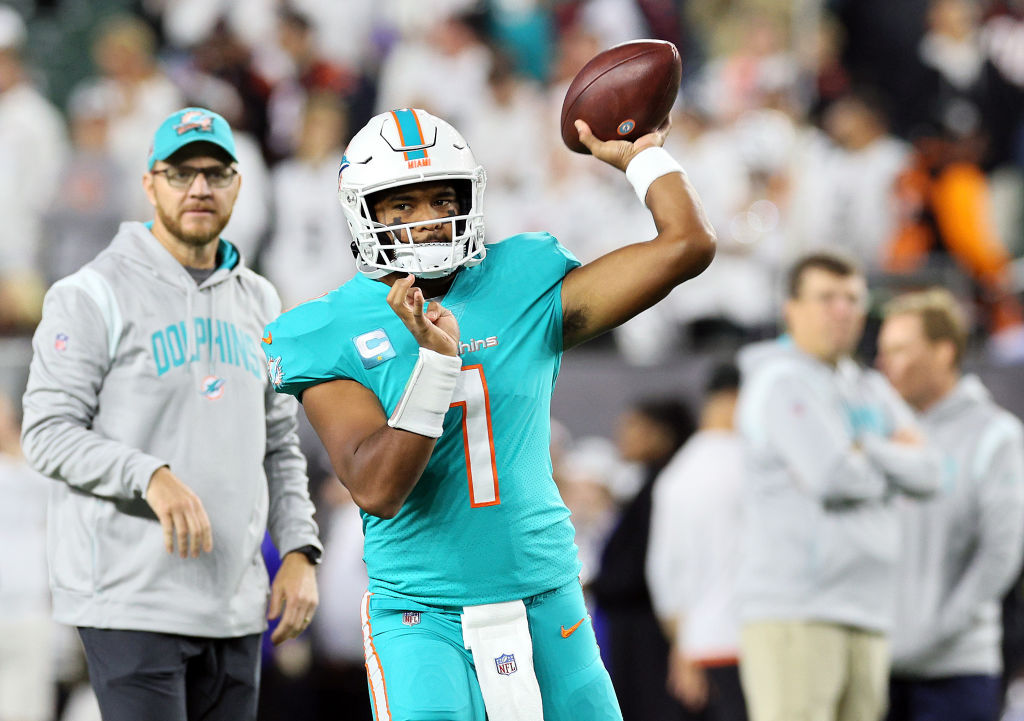
(NEW YORK) — As the fallout over the handling of Miami Dolphins’ quarterback Tua Tagovailoa’s back-to-back head injuries continues, a concussion expert is sounding the alarm, calling on the NFL, players and coaches to do more to protect against potentially life-threatening head injuries.
An independent neurotrauma consultant who treated Tagovailoa following a head injury he suffered during the Sept. 25 game against the Buffalo Bills was fired on Sunday. The quarterback was seen stumbling after he took the hit, leading many to believe he had suffered brain trauma – but the Dolphins claimed the wobble was a result of a back injury.
The quarterback was allowed to return to the Bills game and he was not in concussion protocol after the game.
Four days later, in a match against the Cincinnati Bengals, Tagovailoa was carted off the field after he hit his head following a sack. Fans, former players and others were critical of the Dolphins and NFL for allowing the quarterback to return to the field without conducting a concussion protocol following the game against the Bills.
Chris Nowinski, the co-founder and CEO of the Concussion Legacy Foundation, a non-profit advocacy group, told ABC News’ “Start Here” Monday that despite the increased awareness of concussions and CTE among former athletes, the NFL has been dropping the ball when it comes to preventing these injuries.
“The NFL for the last 15 years has been trying to minimize the role of on-field signs of a concussion so that they would retain flexibility in returning someone to play if they seem cognitively sound enough in the locker room to go back into the game. And this is where it bit them in the butt,” he told “Start Here.”
An investigation into the injuries is ongoing and Tagovailoa is expected to be interviewed, according to ESPN. McDaniel told reporters Monday that the quarterback won’t be playing in the next game against the New York Jets on Oct. 9.
“Anything beyond that…we’re just focused that he’s at optimum health,” he said. “It’s too early for definitive timelines.”
McDaniel said Tagovailoa’s MRI came out clean and he’s still undergoing concussion protocols. While MRIs are used to look for structural damage in the brain as well as bleeding, they aren’t able diagnose concussions.
Concussions are usually diagnosed with physical exams and questionnaires about symptoms monitored for improvement over time.
Shortly after Thursday’s game, the NFL Players Association tweeted “player health and safety is at the core of the union’s mission.”
“Our concern tonight is for Tua and we hope for a full and speedy recovery,” the union tweeted.
The Dolphins tweeted out a statement after the game claiming Tagovailoa “is conscious and has movement in all his extremities.” He was released from the hospital the next day and underwent concussion protocol, according to the team.
McDaniel reiterated Friday that Tagovailoa was cleared by several layers of medical professionals before he was allowed to play.
Nowinski, a former college football player and WWE wrestler who suffered two concussions and has long-term health issues related to those head injuries, put out a tweet before Thursday’s game warning that if Tagovailoa got hit again, “everyone will be sued and will lose their jobs.”
Nowinski, who has a Ph.D. in behavioral neuroscience and has been researching concussions for years, said he saw clear signs of a concussion during the hit during the Bills game, including loss of vision and balance.
“This is absurd. He shouldn’t be out there,” Nowinski said referring to the Sept. 25 injury. “And you never want to return a player because you can die from Second Impact Syndrome or you can get a second concussion that changes your life.”
Nowinski said that Tagovailoa being carted off the field was the worst-case scenario.
“In the second game, his head hit off the turf even harder. And what scared everybody was that Tua showed what’s called decorticate posturing or his arms came clenched against his chest [and] his fingers were splayed and flexed,” he said.
Nowinski criticized the NFL’s current protocol for evaluating injured players. While he noted that there is no objective test or imaging for concussions, he contended medical professionals can easily screen the issue and be stricter about players returning to the field.
“The 15-minute evaluation they do in the locker room is imperfect. We all know it’s imperfect,” he said. “The brain has the magical ability to right itself after a big brain trauma. We’ve all seen people who’ve been knocked unconscious pop up and you test them and they’re fine.”
The NFL and the NFLPA released a joint statement Saturday saying that both parties agreed that, “modifications to the concussion protocol are needed to enhance player safety.”
“The NFLPA’s Mackey-White Health & Safety Committee and the NFL’s Head Neck and Spine Committee have already begun conversations around the use of the term ‘Gross Motor Instability’ and we anticipate changes to the protocol being made in the coming days based on what has been learned thus far in the review process,” the organizations said in their statement.
Nowinski said that the move to fire the doctor that treated Tagovailoa after the Bills game was a sign that Tagovailoa’s reutrn was a mistake.
“I think we can all read between the lines here that something must have gone wrong if that doctor did not think that Tua should be held up,” he said.
Copyright © 2022, ABC Audio. All rights reserved.





